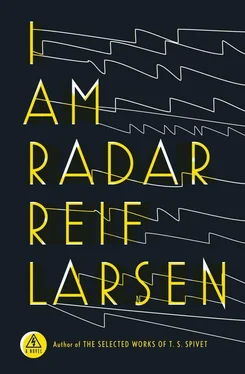“I mean, who’s he to tell us there’s something wrong with him?” said Louise.
“That’s not the point, Mom. We just need to find out what happened.”
“Why?”
“If it was your child, you’d want the same thing.”
“So what’s this doctor going to tell you?”
“I don’t know, Mom. That’s why he’s the doctor.”
On a whim, Charlene had recently contacted Dr. Thomas K. Fitzgerald. Based at Harvard Medical School, Dr. Fitzgerald was a veritable rock star in the field. He was the author of the industry standard textbook Dermatology in General Medicine and recently the creator of the six-point Fitzgerald Skin Type Classification Scale. His handwritten reply to her query, in which he had expressed great interest in Radar’s condition, sat on the kitchen table. The letter, which Charlene had brought to her nose on more than one occasion, carried the faint scent of what must have been the doctor’s aftershave — a slightly unpleasant odor, like molding carrots, but the kind of unpleasant one could come to love.
“Was this his idea?” asked Louise, nodding at Kermin.
“No, Mom, it was our idea. The man’s from Harvard. He’s not some quack.”
“He’s a quack!” said Bertrand, producing various duck noises and pinching Radar’s cheek. Radar giggled at the attention.
Her parents’ skepticism was not without its effect. The steady drumbeat of professional bafflement surrounding Radar’s condition had left Charlene battered by uncertainty. Maybe her mother was right: she did not need another flummoxed doctor, however prestigious, to add to the veritable choir of diagnostic confusion. Charlene silently resolved to file his letter away in Radar’s already bulging medical folder and think no more of it.
In the corner of the kitchen, Kermin was only half listening as he worked the dials of his shortwave, trying to catch a signal from Côte d’Ivoire. This was nothing personal. Try as he might, he could only ever half listen to Charlene’s parents. They generally meant well, but he found they often fell back into that particularly American stance of self-satisfaction masked as liberal open-mindedness, a brand of moral disembodiment to which he had never quite grown accustomed, despite having lived in the country for more than thirty years.
He quietly swore into the cauldron of static coming from the radio’s speaker. The eleven-year sunspot cycle was rapidly declining to a minimum, at which point a year-and-a-half period of near-impossible long-distance communication would descend upon all amateur radio operators. Kermin had cut out a timeline of the last 150 years of this solar cycle from a recent issue of QST and thumbtacked it to the wall of his workshop. In blue pen he had cleverly traced how many of the world’s disasters — Archduke Ferdinand’s and President Kennedy’s assassinations, the 1931 China floods — lined up all too well with each electromagnetic trough.
The Volmers, as they always did, mistook his attentiveness to his radio for calculated resentment. They had slowly constructed a portrait of their son-in-law — through the sad summation of pillow talk and unarticulated accusation — as the instigator and primary engine behind “fixing” their grandchild. In truth, they did not like Kermin at all, though they would never say as much, out of respect for their daughter’s life choices. His awkwardness in conversation and his habit of dismantling electronics during their infrequent visits allowed them to easily cast him as their Balkan scapegoat. He would return from his radio repair closet and utter whatever was on his mind, even if this was not polite (“You look bad. Are you tired?”). He still dropped his articles and slipped up on his tenses in English, substituting future perfect for present perfect — verbal transgressions that Louise, the former grammar instructor, found obtuse and oddly aggressive. “After all these years in this country, he should at least know how to talk about the future,” she had said aloud on more than one occasion. More than anything, they blamed him for sequestering their daughter in the small, nearly impenetrable Serbian Orthodox community in Elizabeth, which was the main reason, they assumed, that she rarely called them anymore.
Several years ago, Charlene had met them at the Newark Museum to see the much-talked-about exhibit of J. M. W. Turner’s seascapes. They walked through the show in silence, squinting at chiaroscuro shipwrecks, and afterwards, in the poorly lit museum café with the wobbly tables, she had announced that she was going to marry Kermin, a man Bertrand and Louise had met only three times, to increasingly poor reviews. They had first protested — Bertrand with silence, Louise with cylindrical sentences that went nowhere — and then, with a thirty-year-old look of surrender passed between them, they collectively sighed and wilted into faux-progressive resignation.
“We’re happy if you’re happy,” Louise said finally.
The wedding was an incense-heavy Orthodox affair that her parents silently endured. Soon after, Charlene came down to Trenton to tell them the news: she was pregnant. It was clear to all that the deed had been done well before the nuptials. A silence descended across the room.
“I didn’t mean for it. . I didn’t want it like this,” said Charlene quietly.
This, too, was digested.
Charlene waited for the wash of disapproval she knew was to come, the chronic sense of condemnation she had come to both begrudge and savor. But then Bertrand rose from the love seat.
“A grandson!” he said.
“We don’t know what it is—” Charlene began to say, but he did not seem to hear her. He hiked up his pants and did a little jig on the rug. It was the first time she had ever seen her father dance. He had always been definitively anti-dance, cultivating a proud stoicism in the face of all organized revelry. Now, to see him move like this — giddy, tout seul, all hips and wobble — felt so intimate that Charlene almost had to look away. And then Louise got up from the couch and they all came in close and held hands. An impromptu communion for the spirit of her unborn child. Bertrand put on a Smokey Robinson record. Charlene slow-danced with her mother while her father reprised his newfound boogie, adding arrhythmic snaps to his repertoire. They were to be grandparents. Such a promise erased all else.
Thus, when Radar emerged in the midst of a fleeting Jersey blackout, Louise and Bertrand were the first to arrive, white peonies in hand, to greet the baby boy they had already predicted was coming. Like everyone else, they were at first shocked by their grandson’s appearance and deeply concerned that something might be seriously wrong. After it had been determined that the child was otherwise healthy, Louise was embarrassed to admit to enjoying a guilty morsel of comfort at the possibility that Kermin might not actually be the father. But this would mean there was an anonymous dark progenitor wandering around somewhere in the belly of the city. Soon they cast all complications aside. This was America in 1975, after all, a land of multiculturalism and acceptance, and Baby Radar was one of their own. Maybe even more so than their own daughter. It was not hard for them to adore him as a counterpoint to Charlene’s recalcitrance, so much so that Louise would ache when she was away from her grandson for any length of time. As Radar was ushered around from one specialist to another, Louise became more and more horrified. She vaguely assumed all of this stemmed from some kind of Old World xenophobia on the part of her son-in-law.
What she didn’t know, because she never asked, was that her own daughter, not Kermin, was the sole engine behind the quest to find a name for Radar’s condition. Kermin had merely become a reluctant follower in their prolonged search for answers. Never once did he lament his son’s appearance or complain about the lot that life had given him. In the wake of World War II, after losing his newborn sister and mother, Kermin had fled with his father across a smoldering Europe to Bergen, Norway, where they snuck onto a thirty-foot boat bound for the New World. After six weeks at sea, Kermin had arrived in New Jersey with a bad case of pneumonia and a distinct perspective on that which was worth worrying about.
Читать дальше












